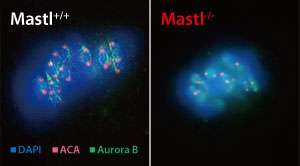Mastl/Greatwall kinase is needed for proper chromosome segregation during mitosis. Credit: A*STAR Institute of Molecular and Cell Biology
A protein linked to cancer helps ensure that chromosomes are apportioned evenly after each round of cell division. This protein, called Mastl in humans, is essential for creating two identical copies of the cell. Its discovery could lead to new therapeutic strategies for targeting tumors of the breast, colon and other organs.
"The fidelity of chromosome segregation is essential to prevent cancer," says study author Philipp Kaldis, a senior principal investigator at the A*STAR Institute of Molecular and Cell Biology. "It's possible that Mastl inhibitors could be used in a therapeutic setting."
Kaldis' lab specializes in a group of enzymes that add chemical tags to proteins to signal when the cell is ready to pass into the next stage of its replication cycle. One of the proteins tagged in this way is Mastl, which is also known as Greatwall kinase in some non-human organisms. The textbook understanding of Mastl/Greatwall has been that the protein is needed for the cell to start the division, or mitosis, process. Researchers had observed this in fruit flies and in frog eggs. Yet Kaldis and his colleagues observed a different process in mice, which are more relevant as models of human disease.
The researchers engineered mice so they could switch off the gene that encodes Mastl. When they did so, cells still progressed into mitosis—unlike in flies and frogs—but the chromosomes didn't pair and separate correctly. This abnormality caused the DNA to unravel.
Kaldis' group showed that this error occurs because Mastl is needed for a critical verification step in the cell cycle: the spindle assembly checkpoint. In this step, various proteins work together to ensure that all the chromosomes are correctly attached to the cell's cytoskeleton so that, when segregation starts, each new cell gets just one copy of each chromosome. Mastl thus acts like a patrolman, keeping watch over this checkpoint so that it's not skipped. To do this it adds chemical tags that modulate the function of essential proteins involved in the process.
In cell culture, Kaldis and his team observed that the loss of Mastl could be overcome with drug treatment, suggesting that this might be a way to treat cancers triggered by mutated Mastl. However, "Mastl has multiple functions in mitosis," notes Kaldis, "and we need to learn more about these" before going ahead and blocking the protein in cancer patients.
More information: M. Kasim Diril et al. Loss of the Greatwall Kinase Weakens the Spindle Assembly Checkpoint, PLOS Genetics (2016). DOI: 10.1371/journal.pgen.1006310
Journal information: PLoS Genetics





















